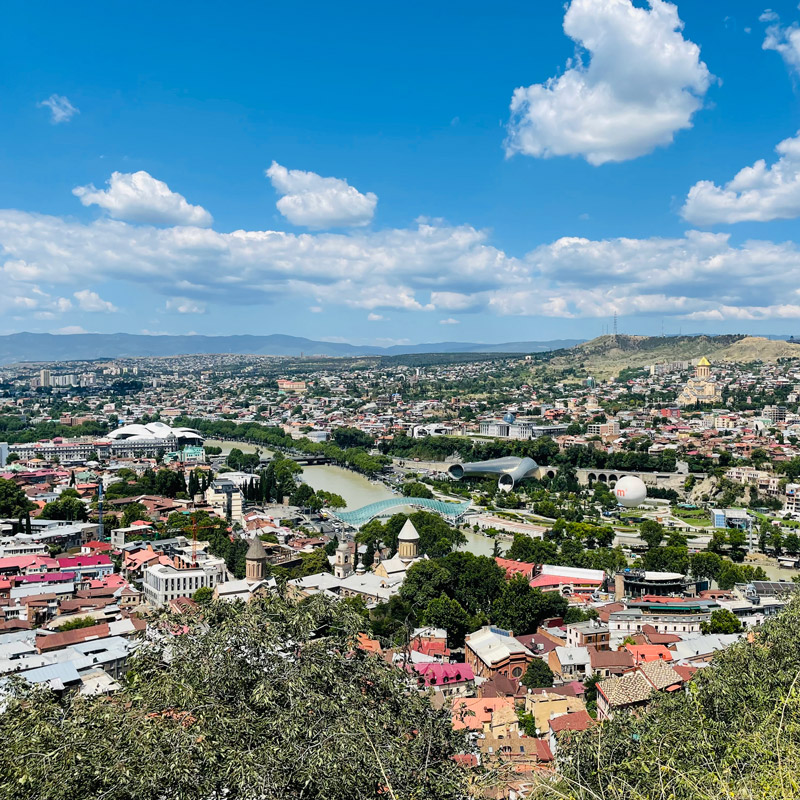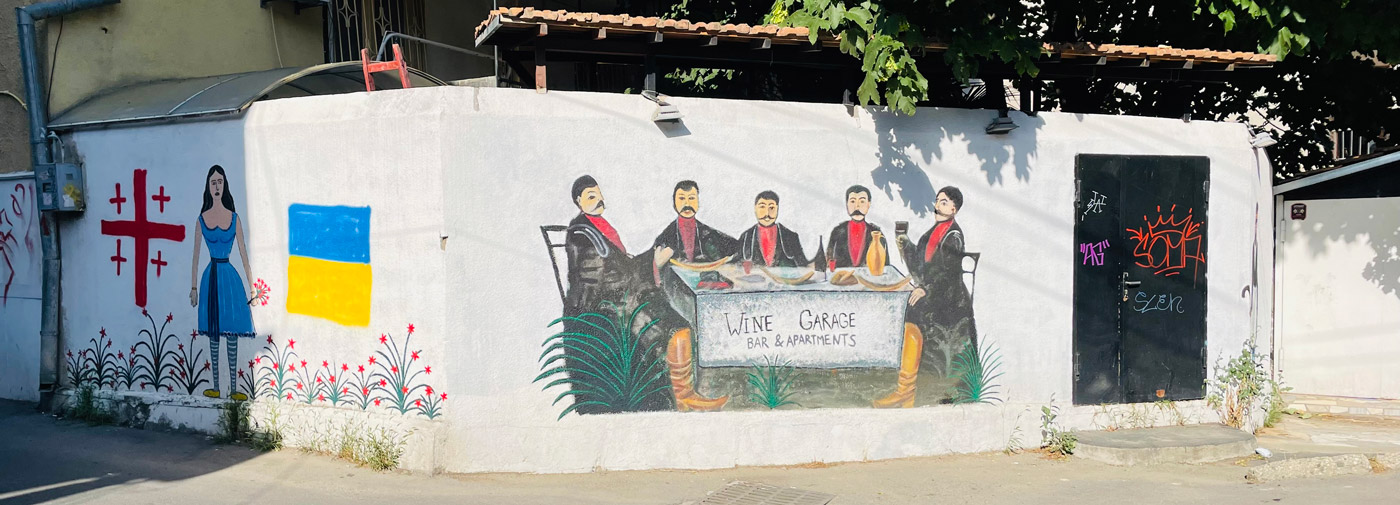Mr Pütz, why did you emigrate to Georgia in 2007?
Pütz: It was a very personal decision. I was diagnosed with advanced cancer in 2006. My doctor advised me to sell my two vineyards on the Mosel, I would not have long to live. And since my daughter didn't want to continue running the businesses, that's exactly what I did. So I was free and went to Georgia according to the motto "It doesn't matter where you die, experience something!".
But why go to Georgia?
Pütz: Georgian viticulture was in crisis at the time and the big companies were looking for foreign specialists. I got an offer. You have to know: Before 2006, they didn't know any sales problems there. On the contrary, the Georgians never had enough wine to supply the Soviet Union and later Russia. But when the then President Saakashvili moved closer and closer to the West, Putin imposed an import ban on agricultural products from Georgia. And the wineries no longer knew from one moment to the next to whom they should sell their wine. I always jokingly say that Georgian winemakers should be grateful to Putin, because this was the birth of Georgian quality viticulture. In the rest of the world, the wines of that time could not be sold. To bring the quality up to international standards, cellar masters and oenologists were brought in from abroad.
What changed there?
Pütz: Parallel to this development, young Georgians went to Germany, France or Italy for training. Today they are among the best winemakers in the country. Bottled wines have not been around for very long in Georgia. In the past, most of it was filled in 10- or 20-litre containers. This wine was drunk en masse at the traditional Georgian "supras", the celebrations at long tables where friends and families gather. Since 2007, however, the quality of Georgian wines has been steadily increasing. Many new wineries have emerged, some under German management, such as the top winery Chateau Mukhrani.
 Tbilisi is a pulsating city full of contrasts.
Tbilisi is a pulsating city full of contrasts.How was the beginning in Georgia for you?
Pütz: Difficult. In the beginning, nothing worked out the way I wanted. When I think back to my first grape harvest, it was a moderate disaster. For one thing, because the wineries here only had Soviet technology, which was designed to process huge quantities in a short time. And I, like other colleagues, had western standards in mind: gentle grape transport, pneumatic presses, flotation. Secondly, there were considerable problems with the translators. Most of them pretended to translate but could not convey the technical terms. So there were many interpretations and bad blood between foreigners and Georgians.
Two completely different cultures clashed at that time.
What exactly were the problems?
Pütz: The differences in mentality between Western Europeans and Georgians are very big. And I approached the matter completely unprepared. One example: when I had to restructure the production process for a large wine and sparkling wine winery in Tbilisi in my first year, I was told, "A Georgian man doesn't clean!" when it came to cleaning the tanks. So women had to come and do the work. Completely incomprehensible to me.
There were also great difficulties in imparting knowledge. I couldn't just tell people that this or that will be done differently from now on. That didn't work. I had to twist it so that in the end they believed it was their own idea.
Georgians are very proud and they are especially proud of their wine. Almost every family here has been making their house wine using the Quevri method for centuries. Some make better wine, some make worse. But you must never tell a Georgian that his wine is not good. Criticism is not welcome, not even constructive criticism. I had to learn that first.
 |
Why did you stay in Georgia even though most of your colleagues left the country again?
Pütz: If I'm still alive today, I also put it down to the fact that I had so much to do here that I couldn't even think about the illness. My commitment today is pure gratitude. But what has mainly kept me here is the enormous potential of Georgian wines, which is still asleep. It fascinates me what can be got out of these autochthonous grape varieties.
What has mainly kept me here is the enormous potential of Georgian wines.
You are also committed to young Georgian winemakers. How do you do that?
Pütz: Right from the first year, I noticed that the Georgian winemakers had a very good university education, but had no idea about the practical side of things. They knew all the chemical formulae by heart, but they didn't know what to do with a kilo of grapes in their hands. I therefore suggested a dual education according to the German system, which I succeeded in doing with the help of the Deutsche Gesellschaft für Internationale Zusammenarbeit (GIZ) in Tbilisi. Then we got the Bavarian State Institute for Viticulture on board. Together we were able to convince the Georgian Ministry of Education to launch the dual winegrowers' training as a pilot project. This has been running very successfully for nine years.
Today, you no longer advise large wineries, but dedicate yourself to a small family winery in Kakheti, in the east of the country. How did that come about?
Pütz: In 2013, the Russian boycott of Georgian agricultural products was lifted. And many wineries fell back into the old system and resumed their exports to Russia on a large scale. I didn't want to go along with that and quit my job at the time.
Already during the Caucasus war in 2008, I got to know the Bedenashvili family. They had two hectares of vineyards in Kardenakhi (Kakheti) and great financial worries because the state support had stopped. I helped them to rebuild their small family winery according to the German model. The small private farms had no modern technology to produce high-quality wines. What was initially just a side job of mine became my main job from 2013.
That means you only work for this winery now?
Pütz: Yes, exactly. Today, the winery has twelve hectares of vines and I take care of both the vineyards and the cellar work. Direct sales in Europe have been taken over by one of the family's sons, who has lived in Heidelberg for many years.
What have you changed?
Pütz: Our concept is: wine and tourism are one. We welcome many German tourists to our winery in Kakheti, do professional tastings and bring people closer to the culture of the country. At the same time, we always remain peasant and authentic. There is no pomp with us, only a wonderful view of the Caucasus. And that goes down well with the tourists. If they want, they can order wine from us and it will be delivered directly to their homes from the warehouse in Heidelberg. In parallel, we have also been doing online tastings since the Corona pandemic, as there have been noticeably fewer visitors in the past two years.
 With the autochthonous grape varieties of Georgia, Hilarius Pütz can fully develop.
With the autochthonous grape varieties of Georgia, Hilarius Pütz can fully develop.What chances do Georgian wines have on the world market?
Pütz: They have to stand out from the other wines. On the one hand with amphora wines, on the other with exotic autochthonous grape varieties that are vinified "European".
Now that you are retired, what are your plans for the future?
Pütz: I would like to pass this family project on to good hands and hope to find a young winemaker at some point who would like to continue my job with commitment. There are currently twelve Georgians studying at Geisenheim University. I am counting on this generation. Together with Dr. Sopiko Ghvanidze, a Georgian from Geisenheim, I initiated the dual training here. Prof. Jon Hanf also works closely with colleagues in Georgia. I hope that this exchange will continue and that Georgian viticulture will be advanced as a result.
One question in conclusion: How are you today?
Pütz: I am doing wonderfully. I was able to beat cancer a few years ago and I am happy every day that I am still alive.